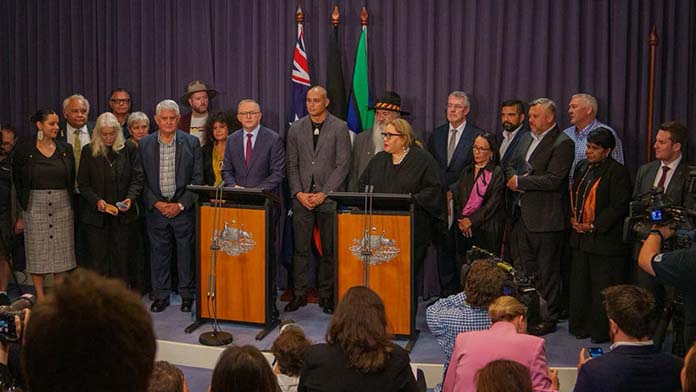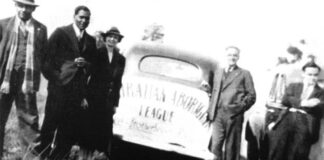Anthony Albanese has unveiled proposed constitutional changes to introduce an Indigenous Voice to Parliament, as well as “design principles” for the body itself. They confirm it will have no real power and be limited to simply offering advice to government.
Peter Dutton and the Liberals are still yet to announce their position on the Voice but are moving closer to opposing it.
Conservatives have demanded a further restriction on the Voice, with the removal of any reference in the constitution to its ability to advise “the executive government”. The government’s Referendum Working Group of Indigenous advisers refused to accept this.
Albanese has brokered a compromise, with a change to the constitutional wording designed to give parliament greater powers over the Voice. The government could pass laws specifying that there would be no chance to challenge government decisions in court on the basis of failing to consult the Voice.
The Voice’s design, “including its composition, functions, powers and procedures”, will be entirely controlled by parliament and the government of the day. The constitution itself would simply say the Voice could “make representations to the Parliament and the Executive Government of the Commonwealth on matters relating to Aboriginal and Torres Strait Islander peoples”.
It will be limited to offering advice that the government can simply ignore. The whole history of the struggle for Indigenous rights is that governments have repeatedly ignored Indigenous demands.
At his announcement Albanese talked up the Voice as a major reform, declaring he was taking the risk of holding a referendum, and possible defeat, because Indigenous people suffer lower life expectancy, worse health outcomes and “massive over-representation in the prison population, in deaths in custody, in children sent to out-of-home care”, claiming the Voice was the way to fix this.
According to Albanese, governments’ failure on Indigenous issues has been “not because of a shortage of goodwill or good intentions on any side of politics” and “not because of a lack of funds. It’s because governments have spent decades trying to impose solutions from Canberra, rather than consulting with communities”.
There have been plenty of policies imposed on Indigenous people. But this is not simply due to lack of “consultation” or misunderstanding about Indigenous demands. Governments have continually chosen to ignore their wishes and advice with the very worst of intentions.
Governments have consistently taken the side of wealthy mining companies destroying Indigenous land. They have refused to fund the housing and services needed, instead pouring money into police and prisons.
This is because real justice for Indigenous people means challenging Australian capitalism. Mining companies want to keep making profits without facing real land rights that allow Indigenous people to veto development.
The rich and powerful don’t want to pay to eradicate poverty and provide proper public services, either in Indigenous communities or anywhere else. Albanese can’t even bring himself to lift JobSeeker from its current rate well below the poverty line.
He is not about to start funding the billions of dollars needed for Indigenous communities still dealing with the trauma of colonisation.
Albanese himself is still ignoring the voices of Indigenous people.
He has done nothing to implement the recommendations of the Royal Commission into Deaths in Custody from more than 30 years ago, despite rising Indigenous deaths in prison and police custody.
He has been silent on the disgraceful new laws from the Queensland Labor government that will further increase the number of Indigenous children in youth prisons.
He supports coal and gas companies destroying Aboriginal land.
And he has broken his election promise to end compulsory income management for Indigenous people.
Useless by design
Albanese wants a Voice that will cover up for his government’s ongoing failures—and a years-long process before it is even established.
The design principles he has announced closely follow earlier proposals from Marcia Langton and Tom Calma prepared for the Morrison government. Members of the Voice would be “selected” by Aboriginal and Torres Strait Islander communities, not elected. This is likely to mean that existing bureaucracies like the Land Councils and service providers reliant on government funding would help choose representatives.
There would be members from each state and territory and the Torres Strait islands, including representatives for remote communities. Langton and Calma envisaged a small body of 24 people, based on 35 local and regional bodies.
Their report estimates that “it could take up to three years for the vast majority of Local & Regional Voices to be fully established” before a Voice to parliament can be formed.
Albanese says Australians “will feel better about ourselves if we get this done”. But feelgood tokenism won’t change anything for Indigenous people—it is going to take a real fight.
By James Supple






